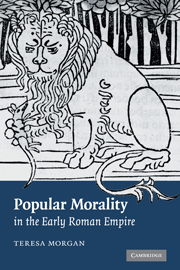Book contents
- Frontmatter
- Contents
- Preface
- List of illustrations
- List of tables
- List of abbreviations
- 1 Introduction
- PART ONE
- PART TWO
- 7 The language of morality
- 8 Moral authorities
- 9 Time and morality
- PART THREE
- Conclusion
- Appendix 1 The political and literary connections of Babrius
- Appendix 2 The definition of a miscellany
- Appendix 3 Popular morality and philosophical doctrine
- List of papyri
- Bibliography
- Index
9 - Time and morality
Published online by Cambridge University Press: 27 October 2009
- Frontmatter
- Contents
- Preface
- List of illustrations
- List of tables
- List of abbreviations
- 1 Introduction
- PART ONE
- PART TWO
- 7 The language of morality
- 8 Moral authorities
- 9 Time and morality
- PART THREE
- Conclusion
- Appendix 1 The political and literary connections of Babrius
- Appendix 2 The definition of a miscellany
- Appendix 3 Popular morality and philosophical doctrine
- List of papyri
- Bibliography
- Index
Summary
There is a time and a place for everything.
English proverbOur last area of investigation in this section on the ‘why’ of ethics, is time. Popular sayings and stories are saturated with statements and assumptions about time. Moral judgements are made on past, future and present. The future or the past often furnishes a reason to behave in one way or another. Ethical debates, decisions and outcomes happen not just in time but because of passing time. Most striking of all, stories and sayings have a good deal to say about kairos or occasio, the idea of the ‘right time’, the ‘right moment’, a moment at which the good or bad consequences of an action can be dramatically magnified.
Proverbs, fables, gnomai and exempla present largely complementary ideas about time, though some themes emerge more strongly in some genres than others. (Kairos, for example, explicitly appears mainly in proverbs and gnomai.) We shall return to kairos later in the chapter, along with ideas about human life, decision making and change in time. We begin, however, with what may seem a contrary theme: the implied timelessness of much of our material, and what it says about the world in which ethical agents imagined themselves to live.
STILL WORLD WITH MOVING FIGURES
The word ‘world’ here is deliberately ambiguous, meaning both human society and the cosmos as a whole. Our sources talk sometimes of one and sometimes of the other, and often in a way which encompasses both.
- Type
- Chapter
- Information
- Popular Morality in the Early Roman Empire , pp. 235 - 256Publisher: Cambridge University PressPrint publication year: 2007



